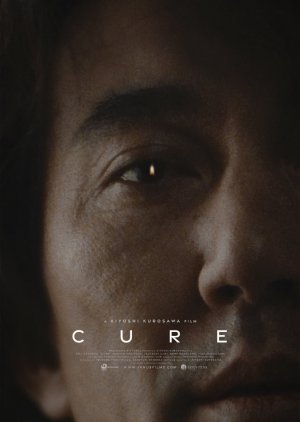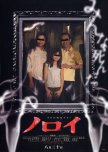
This review may contain spoilers
C U R EC—URE
C—YOU'RE
SEE, YOU'RE
SEE, YOU ARE...
"Who are you? Tell me about yourself."
Kiyoshi Kurosawa's Cure is first, a procedural crime thriller, but foremost, a philosophical and psychological rumination of the societal condition. It is more arthouse and atmospheric than the usual sort of procedural thriller in mainstream cinema. It does not serve a complete and absolute answer. Rather, it gives you questions and clues which lets you think and connect the puzzle, yourself.
In the film, we comprehend that the killer perceives the detective as someone who is not cured.
"The detective or the husband? Which is the real you? Neither one is the real you. There is no real you."
The detective is filled with frustration due to his societal responsibilities. This is his prison since his choices are bounded by societal expectations and not because it completely reflects his own authentic decisions. This prison is what created and worsened the disease in his humanity. He cannot be his real self. He is not cured.
"You’ll be born again, just like me."
Perhaps, the killer wants to free the people from society by letting them truly know and express their profound fears and desires. This is how he will cure them and just like that, they will all be reborn.
It might be true that knowledge is power and to completely know ourselves can be the utmost cure to the disease of humanity and society. Though, does letting our desires and fears own us creates the perfectly authentic self? Or are we just letting ourselves be a slave to them?
In the end, the detective has become the "cured", himself. He didn't repress his fears and desires anymore, but he has become mesmerized by them. Indeed, they have become himself, completely dictating his decisions which also led him to dictate others.
Ironically, the detective has become the society that imprisoned and frustrated him for so long; thinking about what solely makes sense to him and imposing it to others believing that it's the true and ultimate way to be freed and cured.
Just like the long-time, lingering question whether hypnosis is a true science or a pseudoscience: is it really a means to cure or control? Is the detective cured or controlled? Is he curing them or controlling them?
Was this review helpful to you?

Who are you - the question we don’t have an answer to.
Realistically speaking, I understood around 80% of the movie. There are many things that are just hinted at, especially about the details of the resolutions/conclusions. Does it bother me? No. If anything, it makes me more interested in potential rewatch to see if I missed anything. The movie presents a lot of questions, but not all the answers.How much do we change and curate ourselves to match social expectations and responsibilities set by the roles we decide to take? On the other hand, is following our desires the true freedom or just another cage? Driven by desires or led by society - where is the freedom in both, where is the place for personal choices?
These are the questions I kept thinking about while watching Cure. It also reminded me that we as humans love to simplify everything - binary thinking is easier. Extreme solution to mundane problems - that’s how I saw the freedom Mamiya was spreading. Momentary freedom that led to more restraints. Because living is not as simple as always doing what others expect you to do, nor is it simply following your current needs. Forcing others to adhere to your narrow definition of freedom is not setting them free, it’s just taking the leash in your own hands and controlling them by your own standards.
Cure is a great psychological mystery that masterfully crafts the tension. The longer I watched, the more I wanted to get the answers, but by the end, I was fine with still wondering. Strangely it felt as if I was given the freedom to find my own conclusion. It’s not a typical crime movie where we want to know who did it. Rather, we desperately try to figure out why it was done. It’s slow and atmospheric.
With a script like that you need charismatic actors to pull it off. And I was blessed with Yakusho Koji’s performance as Takabe Kenichi - a detective and husband, who struggles with maintaining these two roles, slowly cracking under the pressure. Hagiwara Masato as Mamiya Kunihiko was simply terrifying. Something about that detached, but piercing presence made me feel extremely uncomfortable.
Editing and production was truly perfect. From longer and uncut scenes that created the tension, or the quick cut flashes of moments and frames, that in addition to giving important clues, served as a good indicator of the shift of perspective and the connections the main lead made.
Overall, highly recommend to all the folks who liked to be asked questions and not get conclusive answers, making your own brain do the work. Less investigation, more philosophical. Slow pace might deter some people from watching - proper watching conditions might be the key to enjoyment.
Was this review helpful to you?

I was expecting this film to be so heavy in terms to be enjoyed but actually it pretty much easy to follow but the hypnotic material that this movie throws into my head, like a ticking time bomb.
Just as Takabe comes out of Mamiya's house he suddenly gets a glimpse of things that make me also get almost the same image but a scary woman. From here my defenses have collapsed too, the next series of events tend to give me shock and start to make me uncomfortable, just seeing the dark side of the room that is not exposed to light in this film makes me shiver.
This film really had me drowning without realizing it and it was great. The last time I experienced something like this was when I watched Session 9 last year, simply shocking.
Was this review helpful to you?

Into the Mind’s Fog: How Cure Unsettled My Reality and Haunted My Thoughts
Score: 8/10Watching Cure (1997) was an unsettling journey that really got under my skin. Set in Tokyo, I followed detective Takabe as he delved into a string of bizarre murders where the victims all had the same eerie 'X' carved into them. What gripped me most was how Takabe’s obsession grew, and how the mysterious, amnesiac man Mamiya seemed to cast a hypnotic shadow over everything. It felt like slipping deeper into a foggy nightmare — confusing, haunting, and impossible to shake. 🌀🩸🧩
This film isn’t about cheap scares or loud shocks — it’s about the slow, creeping unraveling of the mind. The mood Kurosawa creates, with those long, silent shots and that pervasive feeling of detachment, made me question what was real and what was illusion. I found myself drawn into the eerie silence, feeling the tension build inside me. The horror was subtle but powerful, touching on ideas of control and madness in a way that felt deeply personal. Sometimes the pacing felt slow, but it only made the tension stronger. After watching Cure, I couldn’t stop thinking about identity, influence, and how fragile our minds really are. This film stayed with me long after the credits rolled. 🕯️🔍🧠
Was this review helpful to you?

It's historical and an absolute must watch for psycological horror fans.
I'm going to keep my review spoiler-free for the reason that you *absolutely* must not have any spoilers going in, it's so much better without, I can't understate that enough.Cure is an absolutely fantastic film, and it's aged incredibly well, despite it being 28 years old as of me writing this. It's shot so spectacularly, there is so much to take in, so much great imagery, it'll be a very good experience.
It's very much for an audience that can go in with an open mind and not expect specific things going in, you need to just let it run its course, and experience it. Make sure you do it in a mind where you can sit down and think about it too, you want to focus on every bit of it you can. I mostly say this because it's a film where you can interpret many different things from it, and you'll want to come to your own conclusion.
The only criticism I would ever give it is that there is a little bit of a lack of a "definitive ending" that one would like, but the way it happens is also satisfying.
I just generally recommend it a lot, and I hope you have as much fun as I did with it.
Was this review helpful to you?











































